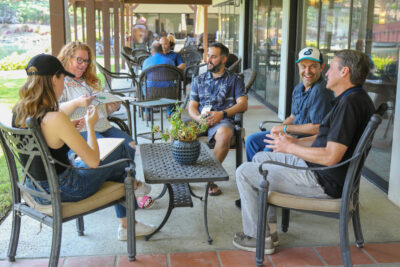
3 Views: Is It Okay to Hire Non-Christians onto My Worship Team?
Every church needs music. Should churches hire non-Christians for their church worship team? We asked three music leaders what they think.
We interviewed three worship leaders to get to the heart of the matter.
Music frames so many elements of Christianity that a worship service without music would be unrecognizable to the earliest Christians, the Apostles, or the Old Testament Prophets. They would think something was seriously wrong with a tuneless church.
Every church needs music, and it should be done well. But there isn’t an equal distribution of talent. Oftentimes, worship leaders must ask: Is it appropriate to hire non-Christians on my worship team?
We interviewed three worship leaders in Washington state to find answers. These are thoughtful men leading vocational lives; while their views differ, I imagine they’d enjoy a coffee together.
Luke Morton, Pastor of Music at Green Lake Presbyterian Church
Green Lake Presbyterian Church has been around a long time by Seattle standards. The church is 79 years old. A few members have attended their whole lives. Starting three years ago, the church broke past 200 members—the high-watermark for many churches—and now enjoys a rising average of 350 attendees across three Sunday services.
Luke has served this congregation for two and a half years. He brought with him a deep affection for an American musical tradition which blurs the line between a hymn and a folk-song. Many of his worship selections are familiar “old-time religion” classics, but he is known to slip in some Bob Dylan during the offering. For him, music is charged with theological significance:
“Could we worship without music? Sure. Are there persecuted, underground churches for whom music is essentially an impossibility? Absolutely. However, in the regular, typical expression of biblical worship, music is a must…It would seem that within worship, [God] has ordained a kind of marriage between music and his revealed Word that is simply irreducible.”
Luke develops his worship team organically. If he needs to fill a musical role, he will keep his ears open to hear if one of the members has a musical background. Then, he will arrange a meeting to gauge their level of skill and interest. Thus far, there’s been no need for him to look beyond his congregation to fill musical roles.
However, if it came to that, Luke says he is open to hiring a non-Christian, provided it was temporary and did not include “a representative function,” such as speaking or singing. Luke is particular about specifically oral roles. Asking non-Christians to lead in singing would be similar to leading in that day’s scripture reading. In an oral role, non-Christians would be required to declare gospel truths they did not believe.
However, Luke is comfortable with a non-Christian in a non-vocal role. His logic is based on the evangelical role of music. He says: “I believe a limited and intentional exposure to the gospel is far more beneficial than the perceived safeguard of having only Christian musicians.”
Additional steps would need to be taken during the hiring process, of course. While non-Christian hires wouldn’t be required to agree with the church’s vision or beliefs, neither should they be opposed to them, or take advantage of their position to undermine them (e.g., wearing provocative t-shirts during the service, etc.). However, in Luke’s mind, hiring a non-Christian is just another way to evangelize to someone who needs Christ. It gives them an excuse to hear the gospel every Sunday:
“I think other churches are concerned about misrepresenting Christ and possibly worried that a non-Christian in worship could cause weaker Christians to stumble. I would like to ask them: ‘What fears do you have with a non-Christian serving in worship for a specific role and limited time? What do you think is preserved in keeping non-Christians out of the church in these roles?’”
Jesse Butterworth, Lead Pastor of Rain City Church
Rain City Church in Bellevue, WA, is a fresh face. Despite opening its doors in 2011, this non-denominational church has ballooned to over 350 regular attendees, and they’re still going. They meet on the campus of Bellevue High School; an appropriate site, given Rain City’s special ministry to young families.
As the name suggests, Rain City Church is loaded with good-natured snark. The tone is relaxed. Sermons are riddled with jokes and stories, and everything from the church podcast to the website to the stage lighting is cozy and tastefully done. “We don’t take ourselves very seriously around here,” says the church website.
Rain City organizes auditions every six months or so to fill positions on the music team.
At the center of it all is Jesse, who, despite his disarming manner, juggles a number of demanding roles. In addition to serving as Lead Pastor and Founder of Rain City Church, Jesse writes songs that are sung in churches around the world. These two vocations, Lead Pastor and music artist, bleed into each other. Music, for Jesse, offers a unique way to know God:
“Music ministry is important because…It’s one of the few places left in life where you hear people singing together. It connects us with God on a different level than if we were listening to a podcast or reading a book…There’s an active connectedness.”
For this reason, carrying an instrument on Sunday, for Jesse, should be seen as a ministry role. Musicians aren’t just filling a function on behalf of the congregation; they are actively facilitating communion between God and worshipper. For this reason, we should expect of them what we expect of any spiritual leader. The two should be judged by the same handbook.
Jesse has serious misgivings about hiring a non-Christian for a musical role. For him, it makes “a statement you don’t want to make.” Just as a Pastor should meet a certain moral and doctrinal standard, so should any spiritual leader–including the one picking at a guitar. Jesse asks of every prospective employee: “Are they living a Christ-centered life?” When they are on the stage, they are more than musicians, but representatives of the Christian life. Jesse would invite them to church, of course, but “I wouldn’t have them on stage on Sunday to play or sing in the band” (emphasis his).
Jesse understands the evangelical appeal of hiring a non-Christian. However, for him, it undermines how the church represents herself to the community. “If what [churches] value is a quality product through music on Sundays, I can understand [why they would hire non-Christians],” says Jesse. “But it makes little sense to me to pay somebody to be in church to play a leadership role in something they don’t believe in.”
Jesse adds that everybody should be in church, but that does not mean by any door. People should visit church because they want to visit church—not because they need a gig.
Brandon Shuman, Worship Pastor of Northshore Community Church
Northshore Community Church is a hulking, geometric building in scenic Kirkland, WA. Reviews on Yelp speak appreciatively of the ample parking lot—a necessity for a church which draws in 3,000 attendees every week, shelving it well above the megachurch benchmark of 2,000. Still, Brandon Shuman, the Worship Pastor, describes the congregation as “growing.”
Northshore puts in the effort to make Sunday a rockstar production. Everything from stage design, to sound, to lighting is sleek and sharply done, chiseled out by an extensive church staff. Brandon draws on over twenty years of experience, as well as his considerable musical skill.
Despite a varied stock of musical talents, Brandon isn’t content to just manage: He wants to be on stage on Sunday, singing or playing guitar, drums, keys, or bass. He says:
“Music is an amazing tool. It helps us feel things. It helps unite us. It helps communicate truth in a way that sticks with us. If music in church is done well, it becomes group expression of art and worship that helps us connect with God and each other.”
Brandon recruits musical talent through auditions held twice a year. Unlike Luke and Jesse, Brandon can’t always rely on a “We met at a bar” approach, given the sheer size of Northshore.
However, he has found that the common love for music has a way of making musicians find each other: “When a need comes up,” says Brandon, “I ask current musicians if they know other musicians who want to participate, I’ve found that good musicians attract good musicians, so I need to be very selective of who’s on stage leading worship with me.”
When it comes to the question at hand, Brandon says the issue should be judged on a case-by-case basis. His view comes closest to Luke’s: he would be willing to hire a non-Christian to play an instrument, because the ideal place for anyone to meet Jesus is in church. “As far as I’m concerned,” says Brandon, “we are called to help lost people meet Jesus, and we must approach this issue through that lens.”
Moreover, Brandon doesn’t need to argue from theory. He has experienced first-hand the effectiveness of transforming the stage into a field for ministry work:
“A drummer came to me years ago and let me know that he was interested in Christianity and wanted to see about maybe playing music with us. He was hesitant because he thought I’d say no. I invited him to play and encouraged him to be honest with the rest of the team about where he was at. The first time he played, he shared with the team that he was exploring Christianity and wanted to spend time with us in order to make an informed decision about faith.”
Surrounded by prayerful Christians who were actively serving the church, it wasn’t many Sundays later when the new hire made a profession of faith and, a month afterward, received baptism. “It was so amazing to invite the rest of the team to minister to him,” recalls Brandon.
Brandon departs from Luke’s view in one respect: The prospective hire must have already expressed interest in Christianity. “If a musician was just looking for a gig,” says Brandon, “and I sensed that they weren’t really interested in the gospel, I’d invite them to hang out with us, but I wouldn’t invite them up on stage yet.” A musical role should not be someone’s introduction to
Christianity, in Brandon’s view, but it is an appropriate intermediary stage.
In this issue, Brandon strongly insists on nuance. Decisions should be made according to the nature of the relationship between the church and the non-Christian in question. He resists general maxims, whether that means anyone can serve in a musical role or only Christians can. His final word: “I’d encourage other churches to have a prayerful conversation about this.”
As with many issues in the modern-day church, approaching each situation carefully and thoughtfully is important because a lot is at stake. In fact, without the right approach and theological understanding, church’s can even face strife and eventual decline. See what your church can do to prevent these outcomes. Download your copy of the free ebook, 5 Bad Habits That Kill Church Growth (And How To Break Them) today.







